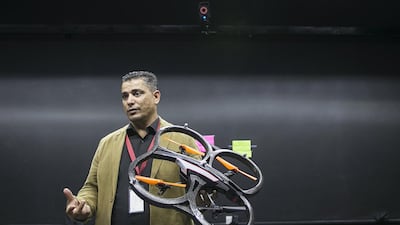ABU DHABI // Equipped with robots, unmanned aerial vehicles and a high-tech motion tracking system, Khalifa University’s new Spacecraft Platform for Astronautic and Celestial Emulation (Space) laboratory is providing students with hands-on experience in what it’s like to work in space.
“It’s like a wind tunnel for space,” said Dr Ahmad Bani Younes, an assistant professor with the university’s aerospace engineering programme, who designed the laboratory for students in his Space Dynamics and Control course.
With the use of multiple robots and six motion-sensing cameras in a black room students are able to visualise and carry out research on how objects, such as satellites, move and operate in space.
“Students will now be able to see their in-class equations come to life in the Space lab,” said Dr Bani Younes. He said he created the Space lab, the first in the country and believed to be the first in the region, based on one he had worked with at Texas A&M University in the United States.
Dr Bani Younes said it had been his goal of establishing the Space laboratory since joining Khalifa University in 2013.
Among those taking advantage of the lab was Abdullah Al Naqeb.
The 20-year-old was utilising the centre to work on his senior project that focuses on emulating the guidance, navigation and control operations of CubeSat Missions – miniaturised satellites for space research design and primarily used by academia.
Made of multiple 10-by-10 by 11.35 centimetre cubic units, with a total mass of no more than 1.5 kilograms, CubeSats are most commonly put into orbit by the arms of the International Space Station.
“I did some research to see if there was anything like it in the region and I couldn’t find anything. There is no other place anywhere nearby where we could conduct these experiments, “ said Mr Al Naqeb.
The aerospace engineering major said the lab would give his fellow students and himself an edge in the Space Launch project, a competition offering students a chance to get their winning satellite project launched into space.
The competition is part of The National Space Programme, a joint initiative launched by The National, the UAE Space Agency, Boeing and 10 other partners last week.
“We have a step ahead of everyone else with the lab and hopefully that will mean a Khalifa University student will win it,” Mr Al Naqeb said.
Another student working on the project said she was excited when hearing about the competition.
“Since childhood, I always dreamed of space and wanted to be the first Emirati in Nasa,” said Fatema Al Hameli, 21.
Having access to facilities such as the Space lab and opportunities through competitions such as the Satellite Launch Project undoubtedly cannot harm her chances.
tsubaihi@thenational.ae

